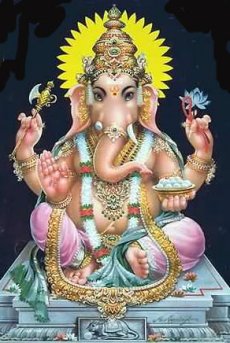Ganesha
From Thelemapedia
Categories: Hinduism | Hindu Godforms | Hindu Gods
In Hinduism, Ganesha (Gaṇeśa, "lord of the hosts," also spelled Ganesa and sometimes referred to as Ganesh in Hindi, Bengali and other Indian vernaculars) is the god of wisdom, intelligence, education and prudence. He is a son of Shiva and Parvati, and the husband of Bharati, Ridhhi and Siddhi. In art, he is depicted as a fat yellow or red man with four hands and the head of a one-tusked elephant, riding or attended to by a Mooshika (Sanskrit for "mouse"). Typically, his name is prefixed with the Hindu title of respect, 'Shri.'
| Table of contents |
Overview
Ganesha acquired his head through varying methods in different stories. In one, Shiva decapitated him because Ganesha refused to allow him to enter the bath while Parvati was bathing. Shiva had to give him the new head to placate his wife. In another version, Parvati showed the child off to Shiva, whose face burned his head to ashes, which Brahma told Shiva to replace with the first head he could find—in this case, that of an elephant. The lack of a second tusk is explained by different myths. An avatar of Vishnu, Parashurama, once went to visit Shiva but the way was blocked by Ganesha. Parasurama threw his axe at him and Ganesha, knowing the axe had been given to him by Shiva, allowed it cut off one of his tusks. Yet another myth is that, in the process of writing the Mahabharata (at the dictation of Vyasa) Ganesh found that his pen had broken, and in the urgency of taking down the great words, snapped off his left tusk as a replacement quill.
Ganesha is known as Aumkara, because his body mirrors the shape of the Aum, the elephant god is thus seen as the embodiment of the cosmos. His elephantine head symbolizes the intelligence and beatitude of the elephant, powerful, yet gentle. His vehicle is a mouse, and this symbolizes the intellect, small enough to find out any secret in the most remote of places. It also signifies his humility, that he espouses the company of one of the smaller creatures.
He is the god of luck and fortune, of doorways, of the household, and of writing. He is the remover of obstacles, and as such it is normal to invoke him before the undertaking of any task with such incantations as "Aum Shri Ganeshaya Namah," (hail the name of Ganesha) or similar.
Festivals and Worship of Ganesh
In India, there is an important festival honoring Ganesha. While it is most popular in the state of Maharashtra, it is performed all over India. It is celebrated for ten days starting from Ganesh Chaturthi. This was introduced by Balgangadhar Tilak as a means of promoting nationalist sentiment when India was ruled by the British. This festival is celebrated and in culminates on the day of Ananta Chaturdashi when the murti of Lord Ganesha is immersed into the most convenient body of water. In Bombay the murti is immersed in the Arabian Sea and in Pune the Mula-Mutha river. In various North and East Indian cities, like Kolkata, they are immersed in the holy Ganga river.
Representations of Shri Ganesh are based on thousands of years of religious symbolism that resulted in the figure of an elephant-head god. In India, the statues are impressions of symbolic significance and thus have never been claimed to be exact replications of a living figure. Ganesh is seen not as a physical entity but a higher spiritual being, and murtis, or statue-representations, act as signifiers of him as an ideal. Thus, to refer to the murtis as idols betrays Western Judeo-Christian understandings of insubstantial object worship whereas in India, Hindu dieties are seen to be accessed through points of symbolic focus known as murtis. For this reason, the immersion of the murtis of Ganesh in nearby holy rivers is undertaken since the murtis are acknowledged to be only temporal understandings of a higher being as opposed to being 'idols,' which have traditionally been seen as objects worshiped for their own sake as divine.
The worship of Ganesha in Japan has been traced back to 806.
Other names for Ganesha
Like other Hindu gods and goddesses, Ganesh has many other titles of respect or symbolic names, and is often worshiped through the chanting of sahasranam (pronounced saa-HUS-ruh-naam), or a thousand names. Each is different and conveys a different meaning, representing a different aspect of the god in question. Needless to say, almost all Hindu gods have one or two accepted versions of their own sahasranaam liturgy.
Ganesha is also known by other names:
- Aumkara, the Aum-shaped body
- Ganapati, Lord of the Ganas, a race of dwarf beings in the army of Shiva
- Vakratunda, Curved Trunk
- Ekadanta, One-Tusked
- Shupakarna, Large/Auspicious Ears
- Gajanana, elephant face
- Anangapujita, The Formless, or Bodiless
- Lambodara, big bellied
- Vinayaka (knowledgeable), Vignesh, Vigneshwara (Vighna = obstacle, eeshwar=lord), Vignaharta - remover of obstacles
- Pillaiyar ("whose child?", Shiva's question in one story of how Ganesh got his head)
References
- Wikipedia (2004). Ganesha (http://www.wikipedia.org/Ganesha). Retrieved Oct. 18, 2004.
External links
- Lord Ganesh (http://www.hindunet.org/god/Gods/ganesh/) - Description on hindunet.org
- Ganesha: The Elephant-God (http://hinduism.about.com/library/weekly/aa083000a.htm)
- Ganesha Chaturthi (http://www.sivanandadlshq.org/religions/ganesh.htm)
- 108 names of Lord Ganesh with meanings (http://www.saranam.com/Deities/108Names.asp)

![[Main Page]](http://www.thelemapedia.org/images/logo.gif)